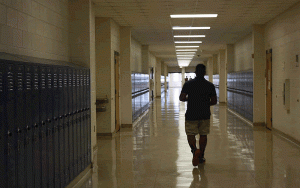
By Andy Brack, editor and publisher | When Statehouse Report was born 17 years ago, its mission was to provide better context and insight into public policy issues impacting the Palmetto State.
Traditional media, we explained to underwriters and supporters, provide pretty good daily coverage of what’s happening in the Palmetto State – although we point out today that the press corps of 2018 is a shadow of its former size. Still, newspapers, radio and television provide immediate insights into what’s happening at the Statehouse. (It would be better to have more watchdogs, many agree.)
But there seemed to be an opportunity in media coverage – to provide depth and insight on critical issues in areas where South Carolina lags – education, health care, taxing wisely and more. Statehouse Report continues to fill that niche of media coverage.

Over the last year, correspondent Lindsay Street has provided an array of outstanding news stories that are ahead of the traditional media curve and provide context for complex issues affecting the state. Here’s a look back at some of our best news coverage for 2018. You’ll see more of this kind of reporting in 2019.
Ahead of the curve
New budget keeps underfunding education by hundreds of millions (March 30):
“Education advocates in the state are cheerleading the Senate’s draft budget for its focus on K-12 education, but they say work still needs to be done to restore the main stream of funding for public schools in South Carolina. State law requires per-student funding for public schools to be $2,959 per year in the 2018-19 budget. But proposed funding for the coming year remains hundreds of millions below required levels.”
Higher ed underfunded by billions, lottery audit says (June 15):
“A new independent state audit of South Carolina’s education lottery spending is a damning critique of the way the legislature appropriates education dollars. Two glaring rebukes stand out in the June report, ‘South Carolina’s Use of Education Lottery Account Funds,’ by the Legislative Audit Council: Underfunding and education funding murkiness.”
Teacher group pushes educators to advocate more (Aug. 10)
“A new South Carolina group of educators says teachers in the Palmetto State don’t want to walk out like peers around the nation who are fighting for higher pay. But the group says it is putting pressure on the General Assembly to raise wages that long have been lower than average.”
“Student Bill of Rights” hits false note, critic says (May 18):
“A state higher education watchdog and advocate is ringing alarms all over the state about the increasing costs of college tuition and a dwindling number of college students. But its recently released “student bill of rights” — aimed at furthering dialogue on higher education — has hit a false note for some.”
Southern Strategy, now 50, is still churning politics (Sept. 7):
“It has been 50 years since candidate Richard Nixon put into action a South Carolina adviser’s plan to prey upon fear and race to get white voters to cast ballots for the GOP. Devised as a “Southern strategy” by native son Harry Dent Sr., South Carolina political observers say the 1968 initiative is far from something in the history books. Rather, it’s alive and well, a continuing font of inspiration for Republican campaigners in an age where rage and race fuels tweets from the current president on down.”
S.C. sits back as others bird-dog regulating emerging tech (Aug. 31):
“State legislatures across the country are taking notice of an emerging technology called “blockchain” that could upend how businesses operate and create a need for regulatory framework. But while South Carolina’s attorney general has made headlines for issuing cease-and-desist letters to two companies using the technology behind the digital currency Bitcoin, South Carolina lawmakers appear flat-footed when it comes to policy to regulate it.”
State’s federal dollars at risk if census participation low, lawmaker says (Nov. 9):
“An accurate population count in 2020 is needed to keep South Carolina’s share of billions of dollars in federal funding from decreasing, according to advocates. South Carolina, where a third of its annual revenues comes from the federal government and more than 15 percent of its residents live in poverty, could be among those states seeing less federal money than needed to take care of its population due to an added question on the 2020 census of a responder’s and their household’s citizenship status, according to plaintiffs in a federal lawsuit.”
Plan to ‘defund’ Planned Parenthood could also expand family planning services (April 6):
“A South Carolina agency is seeking to block public money from going toward family planning services at most non-primary care facilities — a move that would strip Medicaid dollars from any abortion-providing clinic in the state. But in justification of that move, the plan also includes expanding family planning services to make them more comprehensive and address chronic health care problems.”
Coverage gap could halt Medicaid work requirement in South Carolina (June 1):
“While the Trump administration has given the green light for states to restrict Medicaid access by requiring recipients to work, there’s a catch that could derail the effort in South Carolina.”
Bipartisan effort seeks to create child advocacy watchdog (Jan. 19):
“After two years of frightening stories about how an understaffed state agency failed to protect children in its care, two state senators are proposing the creation of a consolidated, watchdog children’s advocate.”
Giving context to big issues
 Legislators eye education fixes after shaky student snapshots (Sept. 13):
Legislators eye education fixes after shaky student snapshots (Sept. 13):
“The annual snapshot of South Carolina’s public school students shows a majority is not meeting grade-level expectations in math or English language arts. With nearly one in four students struggling in those subject areas, an education policy discussion is boiling in the state.”
Catastrophic floods prompt proactive look at disasters (Sept. 21):
“A Charleston lawmaker has teamed with environmental groups to draft two pieces of legislation to help South Carolina become more proactive on flooding. The bills would help move people from low-lying areas and steer future development toward higher ground.”
Lawmakers grapple with question of nuclear regulation (Aug. 24):
“A leak of nuclear material at a Columbia-area uranium fuel plant has prompted lawmakers and neighbors to ask why they weren’t notified as fears of groundwater contamination are renewed.”
What women want: A safer, better South Carolina for themselves and others (Oct. 5):
“The silhouettes representing 29 women slain by men stood silent on the Statehouse steps this week. For some public leaders and advocates, the women were emblematic of a deep cultural problem that can and should be further unraveled with the help of state policy.”
S.C. weaves tapestry of rural health solutions (Sept. 28):
“State leaders are seeking to weave a tapestry of solutions to improve health outcomes for rural South Carolinians, facing deadly threats from preventable and chronic diseases, exacerbated by dwindling places providing primary care.”
S.C. worker shortage in hospitality nears “crisis stage,” experts say (June 22):
“A tightening labor pool and declining wages could spell trouble for one of the state’s biggest economic engines: hospitality. ‘It’s almost in a crisis stage that we can’t fill all of the positions available,’ said Linn Lesesne, co-owner of Charming Inns, a small business comprising four inns and two restaurants in Charleston. ‘We’re constantly looking for front desk and housekeeping and line cooks, we always have positions available.’”
The 2018 session: What’s done and what’s not finished (May 11):
“The second year of the biennial session wrapped up Thursday with some big items left undone, including funding state government and lawmakers’ response to the $9 billion nuclear fiasco that sucked oxygen from the Statehouse for months.”
Ethics reform may be dead this year, despite public support (March 2):
“Ethics reform came in like a lion as lawmakers reconvened in January, but it could depart the session like a lamb – tamed as lawmakers pivoted to other issues such as utility reforms.”
- Have a comment? Send to: feedback@statehousereport.com















 We Can Do Better, South Carolina!
We Can Do Better, South Carolina!